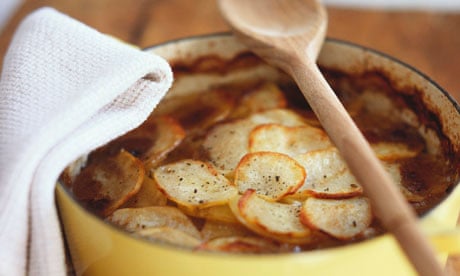At the end of 2009 I finished a journey that had taken me to nearly every corner of Britain. My aim was to meet as many as possible of the people who grow, prepare and sell the food we eat, to construct the perfect "Best of British" menu.
Along the way I met farmers, chefs, butchers, brewers, cheesemakers, distillers, restaurant owners, hunters and fishermen who all took time from their busy schedules to briefly share their lives and food with me. It was a journey that was filled with privileged experiences: I sipped on whisky costing £10,000 a bottle and supped exquisite tea from delicate china cups at Brown's Hotel in London's Mayfair.
It was also a journey blighted with occasional sadness as I witnessed the seemingly terminal decline of some of our most traditional foods. Love them or loathe them, London's pie and mash shops and jellied eel stalls will probably be little more than a memory in less than a generation's time.
Despite this, I returned from my adventure convinced that British food is very much on the up. There were still some experiences that gave cause for grave concern (hang your head in shame, the people who thought that chicken tikka lasagne could ever be a good idea), but we also have a great deal to be proud of and a great many people working hard to bring good food to our tables against tough odds.
It may be a while before some of our European friends give British cuisine more than a disdainful glance, but I remain convinced that we will get there. I don't recommend that you try to eat anywhere near as much as I did in a year, and will certainly not pay your medical bills if you do.
The Midlands
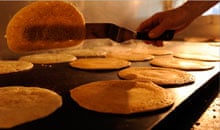
Staffordshire oatcakes
A true regional British treasure, the oatcake, or "oat flannel" as it is sometimes called, fuelled generations of workers in the Potteries. Quite different from its crisp Scottish cousin, the Staffordshire oatcake is more like a dense pancake made from batter containing three types of flour and, of course, oats. As the ceramics factories have disappeared, so too have the bakeries that provided their workers with this sustaining breakfast. However, there remain a dozen or so producers, and between them they still produce 350,000 oatcakes a year, nearly all eaten within the boundaries of Stoke-on-Trent. At the Oatcake Kitchen, former ceramics worker Chris Bates expertly griddles up to 1,000 oatcakes a day. If you think your hunger is up to it, try one the local way, stuffed with cheese. Eat in, or take away as the workers would have done as they rushed to the factory. Delicious.
The Oatcake Kitchen, 8-10 Carlisle Street, Dresden, Stoke-on-Trent
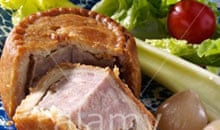
Melton Mowbray pork pies
If I were stranded on a desert island, my dreams would be of Melton Mowbray pork pies. The hand-raised, hot-water pastry, the fresh, seasoned pork and the jelly from trotters make the most perfect combination. In 2009 the Melton Mowbray Pork Pie Association (MMPA) finally attained European PGI (protected geographical indication) status after more than a decade of trying. The name and recipe are now protected and that is a very good thing indeed. If you want to see the fine art of hand-raising a pork pie for yourself, head to Dickinson & Morris in the town centre. It is one of the oldest pie shops, and gives demonstrations.
Dickinson & Morris: Ye Olde Pork Pie Shoppe, 10 Nottingham Street, Melton Mowbray (01664 482068)
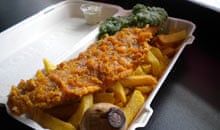
Fish and chips
Like so much of the best of British food, fish and chips is a product of immigration. Portuguese-Jewish refugees brought their skills in the fish-frying department, and collided with their Belgian and French counterparts who knew a thing or three about frying potatoes. The dish was one of the few not to be rationed during the second world war, so detrimental would it have been to the nation's morale. I tried examples in dozens of places, but my favourite was to be found in the unlikely surroundings of a Birmingham shopping centre. Great British Eatery was created in 2007 by two Brummies, Conrad Brunton and Andrew Insley. They fry their fish and chips in beef dripping, and the smell as you walk through the door of their takeaway goes a long way to explaining why the place is a huge hit. Chefs from local Michelin-starred restaurants Purnell's and Simpsons can often be found joining the locals for a late-night fix of some of the very best fish and chips in Britain.
Great British Eatery, 13 Broadway Plaza, Five Ways, Birmingham (0121-456 5955)
Northern England
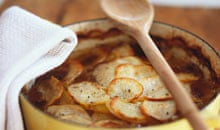
Lancashire hotpot
Few sights are more appealing than that of a hotpot being taken from the oven, its meaty lamb juices bubbling through the golden potato crust. Yet so few people have actually tried a real one. It is a slow-cooked remnant of hard-working times, and deserves to be treasured, particularly when made as well as it is by a terrific young chef, Warrick Dodds of Hastings in Lytham St Annes, a lively modern bistro that uses the very best suppliers in the north-west. Order it with a side dish of pickled red cabbage and a pint of local ale, and follow it with an Eccles cake.
Hastings, 26 Hastings Place, Lytham St Annes, Lancashire, (01253 732400)
London
Jellied eels
People either love them or loathe them. Unfortunately for the few remaining jellied eel stalls in London, the latter seems far more common. This is a great shame because eels, cooked with water, salt and lots of parsley, then set in the gelatine they have released, are surprisingly delicious. Tubby Isaacs' family has been selling eels on Goulston Street, near Petticoat Lane in London's East End, since 1919. This is the perfect place to learn the art of jellied eel-eating from the increasingly elderly customers who pop by for their daily bowl. First you douse them with chilli vinegar, then you slurp the jelly and meat as loudly as possible before discarding the bones on the pavement. You may not like them as much as I do, but you'll be sampling a piece of history that will be all but gone in a generation.
Tubby Isaacs, Goulston Street, London E1 (07846 848813)
Potted shrimps
Brown shrimps with clarified butter and a hit of mace have been a staple of British cuisine since the late Victorian era. Nowhere is this made with more care than at London's oldest restaurant, Rules, in Covent Garden. The shrimp are sautéed then set in butter and lobster oil, and served with just a wedge of lemon and a slice of brown toast.
Rules, 35 Maiden Lane, Covent Garden, London WC2 (020-7836 5314)
Scotland
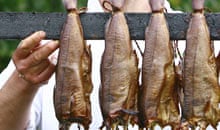
Arbroath Smokies
Arbroath smokies are cleaned and brined haddock that have been hot-smoked over oak chips until their skin is golden and the flesh beautifully white. Iain R Spink and his mobile smoking set-up are a regular sight at the farmers' markets of Fife, and well worth seeking out for one of the finest tastes of my whole trip. The markets are held on Saturdays, rotating between Kirkcaldy, St Andrews, Dunfermline and Cupar. It is well worth getting there early to see Iain and his crew at work, and to buy a hot smokie straight from the fire, with its juices still bubbling under the skin.
Haggis
The haggis by veteran Edinburgh butchers George Bower in Stockbridge are made with the whole "pluck" – lamb's heart, lung and liver – simmered in game stock and then minced twice with fresh onions, pinhead oatmeal and spices. The offally end result may not be to everyone's taste, but there is no doubting that it is the real deal.
George Bower, 75 Raeburn Place, Edinburgh (0131 332 3469)
Chicken tikka masala
Ali Ahmed Aslam, owner of the Shish Mahal curry house in Glasgow, has a strong claim to be the inventor of chicken tikka masala. He created the dish in the mid-70s using a tin of tomato soup to make a spicy gravy when a customer complained that his meal was dry. The rest, as they say, is history. So much so that, in 2009, Glasgow applied for protected status and to have the dish renamed the Glasgow Tikka Masala. That may be a rather silly notion, but a sizzling bowl of tender spiced chicken, cooked in the tandoor then coated with a fiery, tomato-based sauce, is a British treasure. Ali Aslam and his two sons can still be found at the Shish Mahal, carrying plates of their most famous dish to hungry Glaswegians.
Shish Mahal, 60-68 Park Road, Glasgow G4 (0141-334 7899)
Northern Ireland
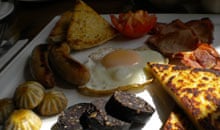
The Ulster Fry
The great British breakfast can be a thing of beauty, but is all too often a plate of stodge floating in grease. Not so at Georgian House in Comber, south of Belfast. Unassuming chef Peter McKonkey has three decades of experience in Ireland's best kitchens and now offers one of the best "frys" in the country. The whopping plateful includes organic eggs, dense meaty sausages, thick smoked bacon, local black pudding, tomatoes, mushrooms and – just to make sure you wobble out the door – the best soda bread and potato farls I have ever tasted. At the time of writing, that all came to £5.95 with a large pot of tea. Peter told me the locals find that "a little dear". Bless.
Georgian House, 14A Newtownards Road, Comber (028 9187 1818)
Yellowman sweets
A treat for sweet-toothed Belfast boys and girls for generations, yellowman was originally created by one Peggy Devlin and sold at the Ould Lammas Fair in Ballycastle. As the name suggests, it is a lurid yellow candy made from caramelised sugar frothed with bicarbonate of soda and allowed to set before being broken into jagged shards. The best-known source for yellowman is now Aunt Sandra's candy shop in Belfast. David, the nephew of the original owner, still makes most of the sweets the shop sells, and gives regular demonstrations.
Aunt Sandra's, 60 Castlereagh Road, Belfast (028 9073 2868)
Wales
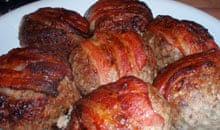
Faggots and peas
They may not have the most appealing name (it comes from the Welsh for "little bundle") or be made from the most tempting ingredients, but these cricket ball-sized parcels of minced pork lung, liver and belly wrapped in bacon or caul (the lining of the stomach) are deeply delicious. NS James family butchers has made award-winning versions since the shop first opened in 1959. Local restaurants such as the Beaufort Arms have them on their specials menu, but I think there is no better way of eating them than straight from the butcher's oven as a takeaway, doused with vinegar and a hit of white pepper.
NS James & Sons, Crown Square, Raglan, Monmouthshire (01291 690675)
Welsh cakes
The chance to join Pat Maddocks as she prepared a batch of 1,000 Welsh cakes in the small kitchen of her Gower home allowed me to relive a slice of my childhood. The smell and taste of her flat, fruit-laden griddled cakes (like small scones to look at but more delicious), taken hot from the stove and spread thickly with butter, transported me back to the days when my own grandmother would prepare them as a treat. Pat and her husband, Anthony, have recently opened a small tearoom where you can sample Wales's finest baked goods, including cakes made with a shot of Penderyn Welsh whisky.
Cakes From Wales, 64 Southgate Road, Swansea (01792 233447)
